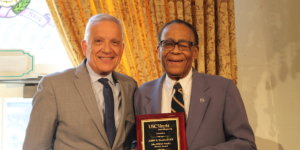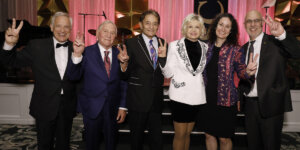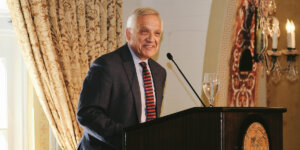
Student ethics competition winner Jacqueline Orr whose proposal looked at autonomous vehicles shakes hands with Kermit Franklin who placed third and whose work looked at the ethical debate around removing confederate monuments Photo / Daniel Druhora
Albert Einstein famously said: “Relativity applies to physics, not ethics,” and nowhere was this mindset more echoed than in the Next Generation Ethics Conference, a March 30, 2018 USC summit surveying the new webs of ethical dilemmas spun by explosions in innovation across disciplines.
Why a next generation?
“Because our world is dealing with ethical questions we haven’t grappled with before,” said Ali Abbas, professor of industrial and systems engineering and public policy, , who organized the conference and directs the Neely Center for Ethical Leadership and Decision Making at USC.
A national research center housed in three schools: the USC Viterbi School of Engineering, the USC Marshall School of Business, and the USC Price School of Public Policy, the Neely Center’s mission is to inspire and develop leaders dedicated to making effective, ethical and legal decisions.
Speakers included Dean Yannis C. Yortsos, of the USC Viterbi School of Engineering; Dean James Ellis of the USC Marshall School of Business; Dean Jack Knott of the USC Price School of Public Policy; Laura Mosqueda, interim dean of the Keck School of Medicine of USC; and Varun Soni, dean of religious life.
“This exponential change and the way society responds is the fundamental challenge of our times.”
Yannis C. Yortsos
The focus on ethics shifts from discipline to discipline but the overriding theme of the conference was that regardless of time and place, irrespective of a person’s cultural and professional context, societal environment, and personal upbringing, there are some things that retain their moral value even in the midst of disruption.
Yortsos said decision-making should lie at the intersection of three circles: smart, ethical and legal. He urged policy makers to “hug the exponential” nascent in the innovation happening across all schools represented and to establish norms and laws aimed at preventing unintended consequences and bad actors.
“Technology is moving faster than regulation and policy. Everyone is racing to catch up with this disruption,” Yortsos said. “This exponential change and the way society responds is the fundamental challenge of our times.”
Should algorithms be accountable?
“Anything with software in it should be of concern to us,” said Vinton G. Cerf, vice president and chief internet evangelist for Google. “Programmers and the companies that hire them must feel responsibility for the bugs they create, and the harm they potentially cause.”
Widely known as one of the “fathers of the internet,” Cerf is the co-designer of the TCP/IP protocols and the architecture of the internet. He emphasized that modern technology is the product of a complex interplay between its designers and the larger society in which it develops. Data giants and the algorithms that drive decision-making should not be immune to the moral suasion of the public at large.
“Gravity is the weakest force in the universe, but when you have a large enough mass of something, it’s powerful,” he said.
Representing the “next gen” in the Next Generation Ethics Conference were thirty students from various schools at USC competing the inaugural student ethics competition, “Towards an Ethically Sensitive Society.” Here are the winners. Follow this link to see all video presentations:
1st Place ($3000)
Jacqueline Orr
graduate fellow, USC Marshall School of Business
Driving the Future: Carmakers’ Quandary with Automated Vehicles
2nd Place ($2000) (Tie)
David Newman
Ph.D. candidate, management and organization, USC Marshall School of Business
When Eliminating Bias Isn’t Fair: Analytics, Algorithms, and Procedural Justice
Fiona Sequeira
B.S., business administration, USC Marshall School of Business
Preimplantation Genetic Diagnosis: A Procreative Right or Responsibility?
3rd Place ($2000) (Tie)
Rashi Chaudhary
M.S., green technologies, USC Viterbi School of Engineering
How Ethics Bias in Corporate Sustainability Reporting Protects Firms from Being Accountable for Negative Environmental Impacts
Kermit Franklin
M.S. public policy, USC Price School of Public Policy
Removing Confederate Monuments, The Ethical Debate
Published on April 13th, 2018
Last updated on April 13th, 2018











